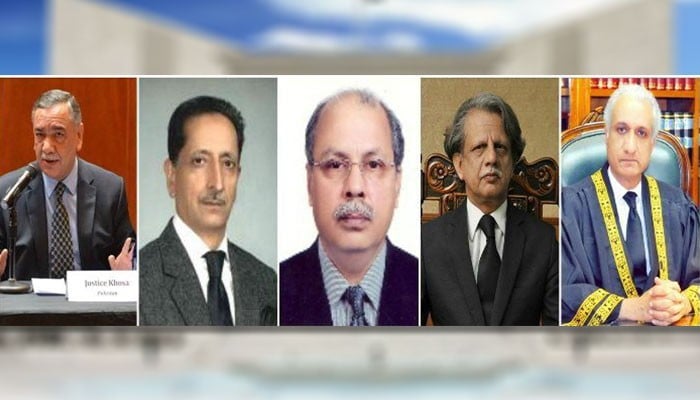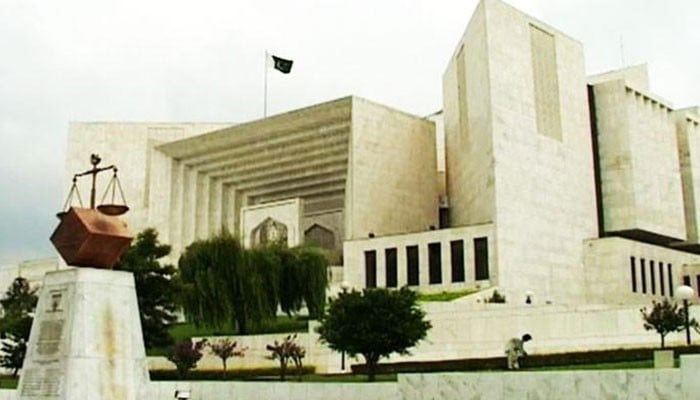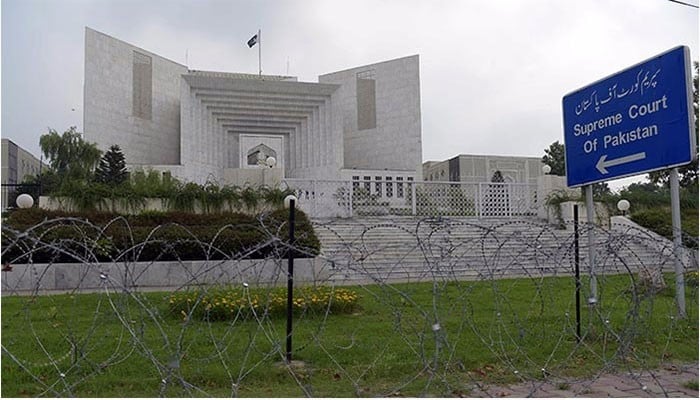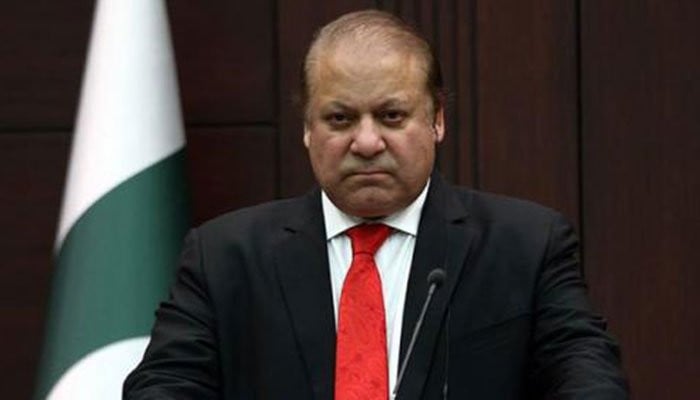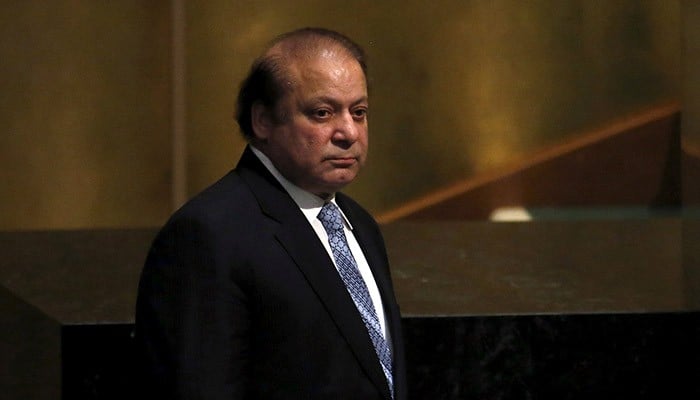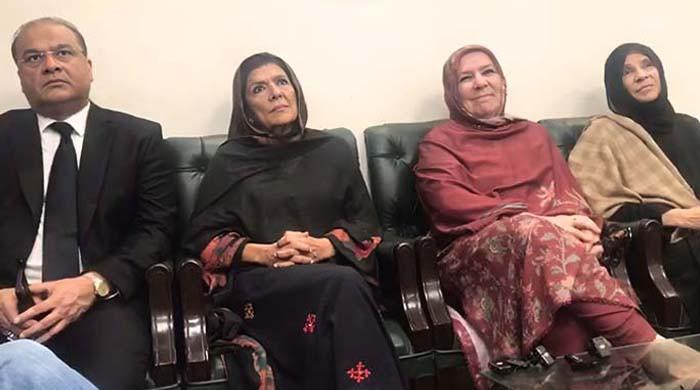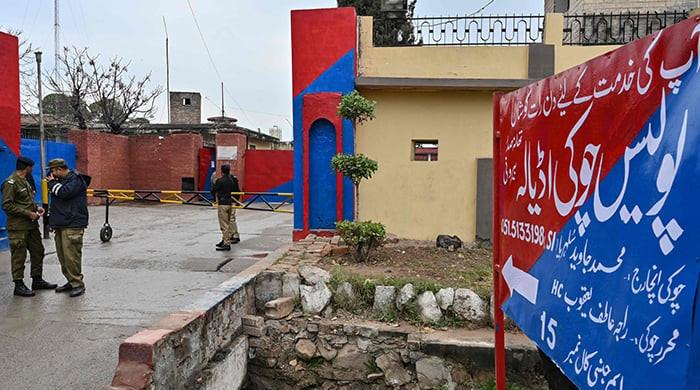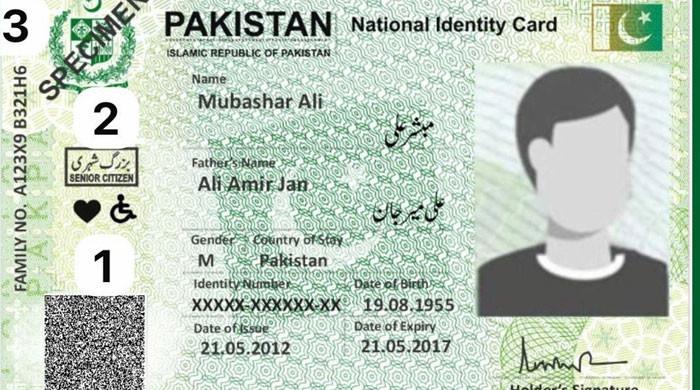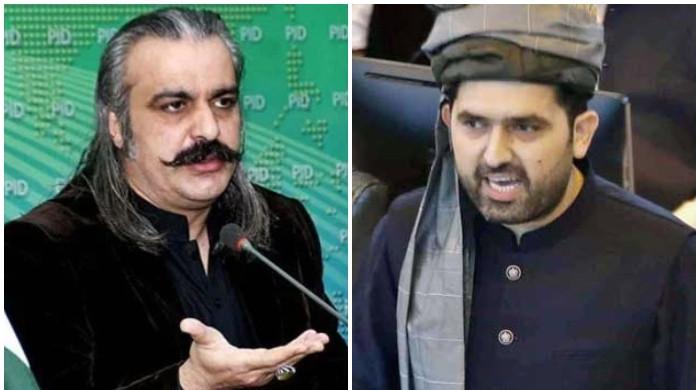Documents show Nawaz received salary from FZE Capital: SC
Nawaz Sharif, his children, son-in-law, and Finance Minister Ishaq Dar have filed review appeals against the Supreme Court's July 28 decision in the Panama Papers case
September 14, 2017
ISLAMABAD: The Supreme Court observed on Thursday that documents submitted in court during the Panama Papers case proved that then prime minister Nawaz Sharif received a salary from a UAE-based company in August 2013.
The observation came as the apex court's five-member bench, headed by headed by Justice Asif Saeed Khosa, resumed hearing of review petitions filed by the Sharif family and Finance Minister Ishaq Dar against the apex court's judgment in the Panama Papers case on July 28.
Other members of the bench include Justice Gulzar Ahmed, Justice Ijazul Ahsan, Justice Sheikh Azmat Saeed and Justice Ejaz Afzal Khan — who along with the latter two headed the special implementation bench in the Panama case that oversaw the work of the Joint Investigation Team.
Continuing his arguments from Wednesday, Nawaz's lawyer, Khawaja Harris, argued that Nawaz never claimed to receive any salary from FZE Capital.
He added that a proper trial is needed for a lawmaker's disqualification, saying that if just his election was termed void then Nawaz would only have been barred for one term.
Justice Ejaz remarked that Nawaz Sharif did not declare a salary account and that documents submitted in court state that he received in August 2013 a salary in his FZE Capital account. He observed further that the relevant record in this regard is present in the JIT's Volume IX.
Adding to this, Justice Ahsan remarked that Nawaz's employment number is 194811 and that documents state that he received a salary.
Justice Azmat stated that the apex court made its decision in the case on verified facts.
However, Harris reiterated that Nawaz never received any salary from FZE Capital in any of his accounts.
Terming the JIT report incomplete, Harris said the JIT received most of its documents from sources and had faults in it.
Justice Ejaz responded that the faults in the report will benefit your case.
"You will have a complete chance for cross-examination in the trial court," he remarked. He added that the bench has not considered the JIT report the undeniable truth and did not make its decision on the basis of the JIT report.
During the hearing, when Harris argued that the court should have directed NAB to file references if it considered them fit, the bench responded that had the matter been left to NAB alone the references would not have been filed.
The hearing was then adjourned briefly.
As Harris resumed his arguments, Justice Azmat remarked that the counsel should "have faith in the court not the streets", adding that the court will ensure that no injustice occurs during the trial court proceedings.
The bench further observed that the appointment of a monitoring judge is nothing new.
After Harris completed his arguments, the finance minister's counsel, Shahid Hamid, began presenting his arguments.
Hamid, in response to the court's judgment that Dar's assets grew unproportionate to his known sources of income, argued that his client's assets did not grow overnight but expanded over a course of 15 years.
He also argued that the court needs to set boundaries of its jurisdiction, to which the bench responded that the boundaries are set from case to case.
The bench also observed that the counsel should point out exactly what parts of the judgment he wants to be reviewed by the apex court.
In his client's defence, Hamid informed the court that NAB in 2016 had cleared his client in the case of having assets beyong known means of income.
The hearing was then adjourned until Friday.
The bench is the same that delivered the final judgment in the high-profile case leading to Nawaz's disqualification and filing of anti-corruption references against Sharif family members and Dar.
The counsel for Nawaz's children and son-in-law, Salman Akram Raja, was also present in the courtroom and is expected to present his arguments tomorrow.
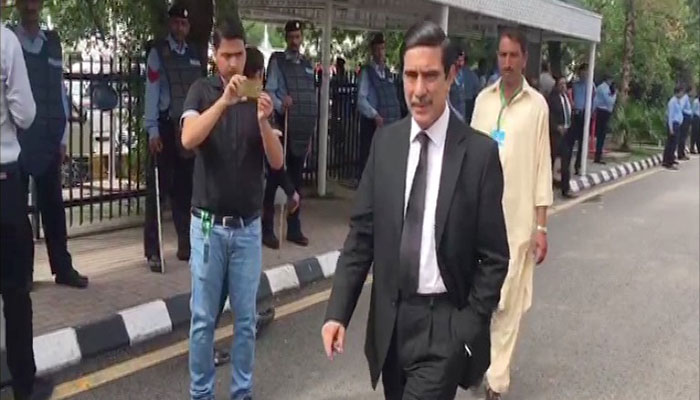
During the Wednesday's hearing, Harris argued that the final verdict [in the Panama Papers case] by the five-judge bench was not right as two honourable bench members had on April 20 given their verdict [on disqualification].
Justice Khosa observed that the reasons [of the judges] to disqualify Nawaz as prime minister may have differed but the decision was unanimous.
Justice Azmat also remarked that the final Panama case verdict was to be decided by the same five-member bench which had given the April 20 judgment.
The former prime minister, through his petition, has argued that the decision passed by the court on July 28 should have been passed by a three-member bench as Justice Khosa and Justice Gulzar Ahmed's jurisdiction had expired after their dissenting judgment on April 20. The same has been argued in petitions filed by Nawaz’s children, Hasan, Hussain and Maryam and son-in-law MNA Captain (retd) Safdar as well as Dar.
"Nawaz's basic rights were usurped by appointing monitoring judge," Harris said further on Wednesday.
Justice Ejaz responded that the accountability court [where corruption cases will now be heard] is free to reach its own decision. The quality of investigation can be reviewed and the petitioners will be allowed the opportunity to cross-question witnesses and JIT members, he added.
Justice Khosa also observed that the content could be different but the result was the same. “Nawaz Sharif was disqualified in both judgments,” he remarked.
However, Harris maintained that a five-judge bench could not have given the July 28 judgment.
New bench formed
The Supreme Court had decided on Tuesday to the Sharifs’ plea [submitted on Monday] that a five-judge bench is formed to hear the review petitions against the Panama Papers case verdict instead of an already-formed three-member bench.
During the hearing of the plea by the Sharifs for the formation of a larger bench on Tuesday, the Sharif children's counsel pleaded the three-member bench of the apex court, headed by Justice Ejaz and comprising Justice Azmat and Justice Ahsan, to form a five-member bench to hear their review petitions.
He also pleaded that their review petition against the judgment of the five-member bench be taken up first.
Justice Ejaz observed that the three-judge bench gave the majority verdict in the Panama Papers case and that the decision would not have been different had the three-judge bench given a verdict in the case.
However, the bench accepted Raja's plea and sent to the chief justice a request seeking the formation of a five-judge bench, which was notified later in the day.
Nawaz's review petition
On August 15, the former prime minister filed three petitions in the Supreme Court to review the Panama Papers verdict which resulted in his disqualification.
The petitions pleaded the apex court to dismiss the petitions filed by Sheikh Rasheed, Imran Khan and Siraj-ul-Haq.
The former prime minister, through his petition, argued that the decision passed by the court on July 28 should have been passed by a three-member bench as Justice Asif Saeed Khosa and Justice Gulzar Ahmed's jurisdiction had expired after their dissenting judgment on April 20.
"That by signing the Final Order of the Court dated 28.07.2017, the hon’ble two Members of the “Bench” have actually passed two final Judgments in the same case, which is unprecedented in judicial history," said the appeal filed, a copy of which is available with Geo News.
The petitions also called the commendations and appreciations of the JIT "a gross transgression" of the former prime minister's right to a fair trial.
The former premier has also filed a request before the apex court to issue a stay order on the implementation of the Supreme Court verdict.
Ishaq Dar's review petition
On August 21, Finance Minister Ishaq Dar filed a review petition against the Panama Papers case verdict.
Dar’s petition was filed by lawyers Shahid Hamid and Dr Tariq Hasan, who requested the apex court to null and void it's July 28 decision and to halt the NAB references against Dar till the verdict on the review petition.
In the nine-page review petition, Dar objected on the working of Panama case JIT, stating “the JIT self-evidently exceeded its mandate by opining on whether or not Petitioner’s assets were disproportionate to his known source of income and this august Court has regrettably erred in law…. in passing a NAB reference against the petitioner on the basis of a JIT report that was way beyond its mandate.”
The finance minister in his appeal also mentioned that Article 184 (3) of the Constitution cannot be used to usurp basic human rights of an individual, further adding that a three-member bench heard the Panama case after the submission of the JIT report, but the final decision was given by a five-member bench.
Dar also said that the appointment of a judge to monitor NAB’s proceedings will affect the trial proceedings.
Sharif children, son-in-law file review pleas
On August 25, Nawaz's children and son-in-law also challenged the apex court's July 28 verdict.
One review petition was filed against the three-judge decision and another against the five-judge decision of the apex court.
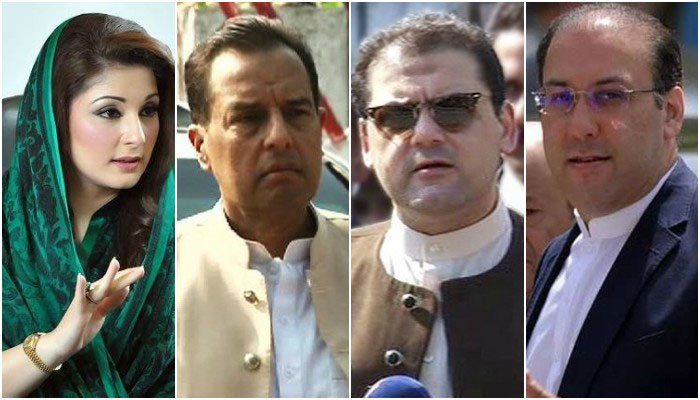
There is no accusation or evidence against Safdar, Nawaz's son-in-law, regarding the purchase of the Sharifs' London properties but still NAB was ordered to file a reference against him, the petition claimed.
It said further that the posting of a monitoring judge to oversee implementation of the verdict is against the law, explaining that the accountability court cannot operate independently after the appointment of an implementation judge.
The petitioners claim that their basic rights have been infringed upon as their objections to the JIT's final probe report were not taken into consideration. Moreover, it is stated that the JIT investigation was incomplete and thus cannot be used as a basis for filing a NAB reference.
It has been argued in the review petition that the original five-member bench could not have delivered the final verdict as two judges from that bench were no longer part of the proceedings since the JIT's work was overseen by the special three-member implementation bench.
The Panama Papers case verdict
Nawaz was disqualified under Article 62 (1)(f) of the Constitution by the Supreme Court on July 28.
Announcing its verdict in the high-profile case, the five-member bench had unanimously disqualified Nawaz for failing to disclose his un-withdrawn receivables constituting assets from UAE-based Capital FZE in his nominations papers for the 2013 General Election, stating that this meant he was not ‘honest’ and ‘truthful’, as per the Constitution.
In the verdict, all five judges ruled to send references against Nawaz Sharif, his children, son-in-law and Dar to an accountability court.
The court also ordered the National Accountability Bureau (NAB) to file a reference against the accused in an accountability court in six weeks and directed for the trial to be wrapped up within six months.
The NAB, as per the directives, has filed the references in the accountability court of Islamabad.
